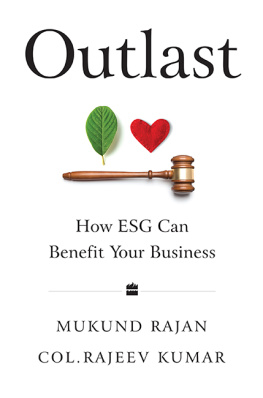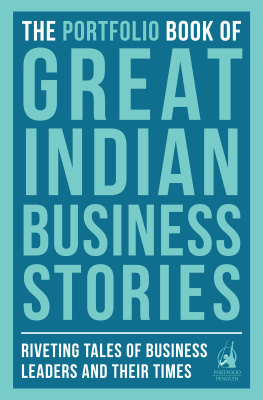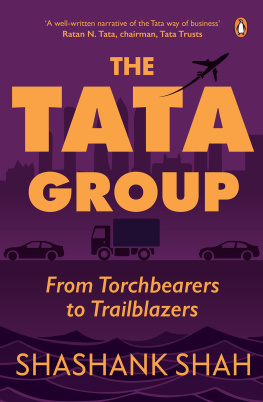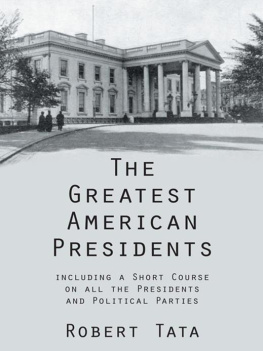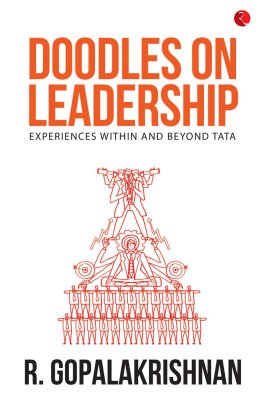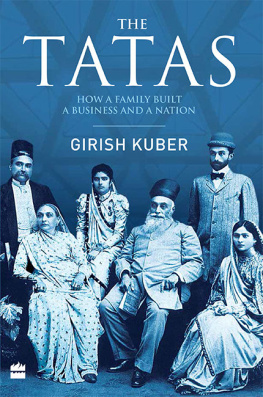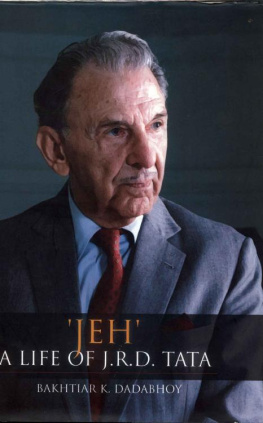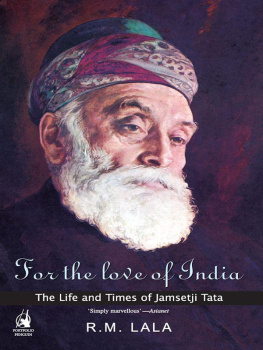Table of Contents
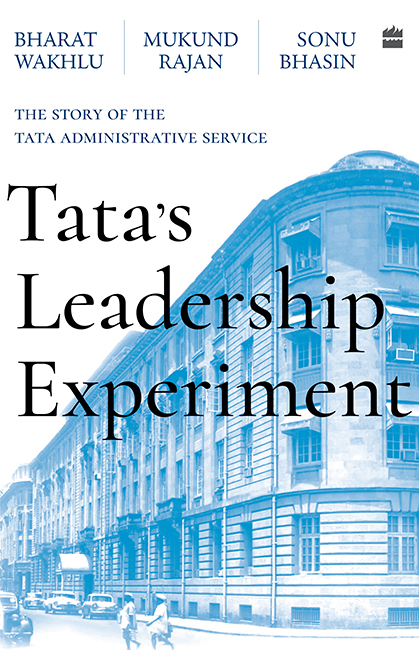

Dedicated to the memory of JRD and his vision of leadership
Contents
Part I
The Genesis of the Tata Administrative Service (TAS)
Part II
The Post-JRD Era
Part III
Leaders for the Future
T HE TATAS, ALSO KNOWN AS THE TATA GROUP, IS INDIAS LARGEST corporate houseby revenue, number of employees, and percentage of stock market capitalization. The Group has a unique ownership structure, which has been in place for almost a century; charities own the majority stake in the Groups holding company, Tata Sons. Equally distinctive is the Groups purpose orientation instilled by the Founder, Jamsetji Nusserwanji Tata. His inclusive view of business found its way into the work of the charities, as well as that of the Tata companies.
In 1938, a very young JRD Tata took on the chairmanship of the Group. He was only thirty-four years old when he inherited the position in what was the largest industrial group of India at that time. Under his leadership, the company assets grew manifoldfrom USD 100 million to over USD five billion over the next five decades. He started with fourteen ventures in the Group and when he retired, after fifty-three years, the Tata Group was a conglomerate of over ninety-five enterprises.
JRD realized fairly early in his role that he needed people with calibre and intelligence who could help him grow the Group. He was not even a college graduate but understood the importance and need for all-round leaders in the overall leadership structure of the Tata Group. In the mid-1950s, there were no management schools in India that JRD, and the Tata Group could visit to select the right people who could be groomed as future leaders. The key focus, according to JRD, needed to be on the process of developing leaders. He was mindful that the development of leaders within an organization is a journey, not an event.
Leadership development takes time. On-the-job training and application of skills enables leaders to gain insights and experience that no academic course can ever deliver. Furthermore, the journey of development within an organization helps leaders to grow within the prevalent culture. With this as one of the core themes in his quest for talent, JRD envisioned the creation of an exclusive management cadre for the Group, christened as the Tata Administrative Service (TAS); this was created in the same vein as the Indian Administrative Service (IAS) of the Government of India. A TAS Committee, tasked with the responsibility of recruiting the finest brains for the Tata Group, was set up. JRD was clear in his directions to the Committee. He was looking for future leaderspeople who would not only grow with the Group, to later take on leadership positions, but also perpetuate Tata values, including integrity, excellence, unity, responsibility and a pioneering spirit that spoke to nation-building. He also envisaged that the members of the cadre would be encouraged to move between different Tata companies and functional areas before settling down in one company. The first TAS officer was selected in 1956.
JRD conceived the idea behind TAS, ensured its birth and nurtured the cadre in its initial years. Early batches of the TAS clearly remember, with great fondness, many conversations with JRD, during which he shared his vision for the cadre. Like any indulgent parent, he wanted only the best for the cadre and those who would be its legionnaires. The TAS was expected to become the Groups general cadre management team and a critical source of leadership talent for diverse Tata companies.
It is also a fact that JRD did not have any children to carry his and the Tata Groups legacy forward. He did look upon his brother-in-law, Leslie Sawhney, as his successor; but it was not to be, as Sawhney died of a heart attack in the 1960s. His death may have strengthened JRDs desire to nurture a cadre which would take the Groups legacy forward. In fact, within the Tata Group, the TAS was colloquially referred to as Tatas Adopted Sons!
In this book, we have explored the concept of the TAS and its various facetsboth positive and negativeas it developed over sixty-five years. Since the TAS is an intrinsic part of the Tata Group, we have also examined and analysed various events in the life of the Group as it strode confidently to become bigger each year. Because we have ourselves been a part of the TAS, we are well placed to present an inside view. While there have been many books written about the Tatas and the Tata Group, this is the first time that the TAS and its officers are the protagonists; the Group is seen here through the eyes of a cadre.
A book about the TAS cannot be written, however, without a broader focus on the Tata Group as well. Thus, the various changes that the Tata Group experienced, coupled with those related to the Indian business environment, more generally, especially after 1991, have been narrated and analysed in this book. Since there is very little written about the TAS and its people, we have relied on interviews and conversations with many of the cadres officers.
While we were always aware of the sterling professional qualities of TAS officers, the writing of this book sharpened the awareness that the TAS was, and continues to be, a very special cadre. The quality of people recruited, especially in the last century, was commendable. It is not a coincidence that almost all the officers, both past and present, are eclectic and humanereflecting the effort and the thoughtfulness that went into their selection. They were selected through a meticulous and uncompromising selection procedurethe final stage of which, for many years, lasted as long as three days. The candidates were assessed on a host of exacting dimensions of management and leadership to assure the selectors that the officers chosen would be able to handle power and authority without losing their heads and, more importantly, that they would take decisions and actions that would be ethical, alwayseven in difficult timesremaining upright and upholding the values that were critical to the Tatas.
As you will see in the following pages, the recruitment strategy used was different from other typical selection processes for managerial positions. Senior Directors at Tata, including Chairman JRD thereafter, spent considerable time getting to know the candidates before making well-deliberated selections after almost two or three days of intense interaction.
With such a thorough filtering process in the initial stages of recruitment, it would have been natural to assume that everyone who was part of the TAS would have stayed on and gone on to lead a Tata company (or two). This book presents evidence that this did not happen, though quite a number made a name for themselves within the Group and also outside of it. We have examined the reasons that prevented the TAS from delivering its full promiseboth to the officers and to the Groupas candidly as we could. We present accounts of TAS officers, and hope that the leadership lessons from their careers will be instructive to other managers.The book concludes with a look into the future, and the manner in which managers and leaders will create, and deliver value, in the decades to come. We believe that the commitment to values and community-orientation of the House of Tata will serve as valuable guides for other organizations.
I REMEMBER THAT RIGHT FROM THE BEGINNING, EVEN DURING OUR interviews, we were told about the Tata values, says Bharat Wakhlu (co-author of this book and TAS officer from the batch of 1985). The Tata valuesthe intangible glue that binds the Group and its people within and creates a unique culturewere crucial to the formation of the TAS. The Groups values are not a product of the JRD Tata or the Ratan Tata eras; they go back to the founder, Jamsetji Nusserwanji Tata (18391904). Jamsetji was barely eighteen years old when the First War of Indian Independence broke out in 1857, affecting a number of major cities and towns in north and central India. In Bombay at the time, Jamsetji was due to graduate from the Elphinstone College; the developments around what the British termed a sepoy mutiny would definitely have made an impression on the young man.


